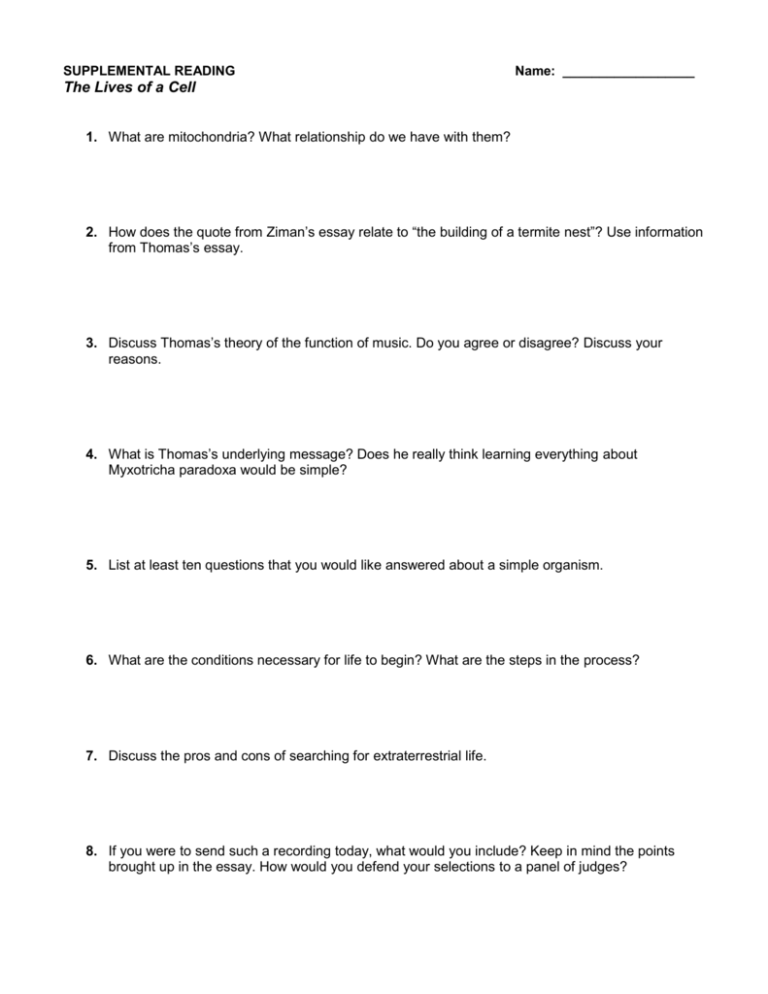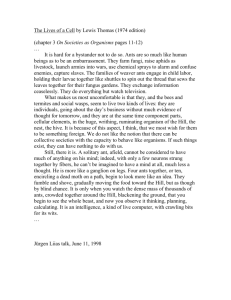The Lives of a Cell
advertisement

SUPPLEMENTAL READING Name: __________________ The Lives of a Cell 1. What are mitochondria? What relationship do we have with them? 2. How does the quote from Ziman’s essay relate to “the building of a termite nest”? Use information from Thomas’s essay. 3. Discuss Thomas’s theory of the function of music. Do you agree or disagree? Discuss your reasons. 4. What is Thomas’s underlying message? Does he really think learning everything about Myxotricha paradoxa would be simple? 5. List at least ten questions that you would like answered about a simple organism. 6. What are the conditions necessary for life to begin? What are the steps in the process? 7. Discuss the pros and cons of searching for extraterrestrial life. 8. If you were to send such a recording today, what would you include? Keep in mind the points brought up in the essay. How would you defend your selections to a panel of judges? 9. At what point in the essay does Thomas first make a comparison between the ant colony and people? How is this comparison made? 10. How are colonies of social insects, such as ants and termites, and human communities alike? What are the fundamental differences? 11. How are colonies of social insects, such as ants and termites, and human communities alike? What are the fundamental differences? 12. “The man who catches a meningococcus is in considerable less danger for his life, even without chemotherapy, than meningococci with the bad luck to catch a man.” What does Thomas mean by this statement? 13. Is Thomas drawing social parallels in this essay? Explain. 14. What would be the results of death in the open? 15. How does the view of “Natural Science” and scientists compare with the more traditional view of cold, sterile laboratories occupied by detached people in white coats? Which view generates more excitement about science and research? 16. Discuss the differences between basic research and applied science. 17. “The surprise can be because it did turn out as predicted . . ., or it can be confoundment because the prediction was wrong and something totally unexpected turned up, changing the look of the problem and requiring a new kind of protocol. Either way, you win.” What does Thomas mean by “Either way, you win”? 18. What does Thomas have to say about the similarities between the activities of ants and human language development? 19. “We have DNA for grammar, neurons for syntax.” What does Thomas mean by this? 20. Would it help or hinder communication if everyone knew the history of all the words they used? 21. What does Thomas mean by mutants? Who would be some of those mutants, and why would they qualify? 22. What does Thomas mean by “. . . the Art of Fugue and the St. Matthew Passion were, for the evolving organism of human thought, feathered wings, apposing thumbs, new layers of frontal cortex”? 23. “What we need is more crowding, more unrestrained and obsessive communication, more open channels, even more noise, and a bit more luck.” Do you agree or disagree? Explain your reasoning and how it differs from or supports Thomas’s point. 24. Did you like this book? Why or why not? 25. What did you learn about the scientific process by reading this book?











